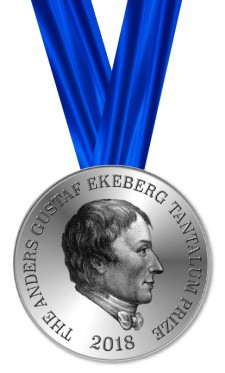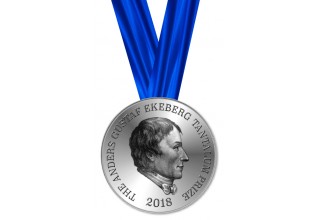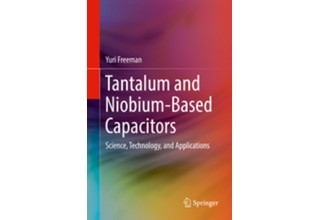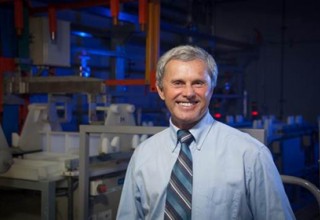Announcing the Winner of the Anders Gustaf Ekeberg Tantalum Prize 2018: Dr Yuri Freeman for 'Tantalum and Niobium-Based Capacitors'

BRUSSELS, Belgium, September 10, 2018 (Newswire.com) - The Anders Gustaf Ekeberg Tantalum Prize (‘Ekeberg Prize’), awarded annually for outstanding contribution to the advancement of the knowledge and understanding of the metallic element tantalum (Ta), has been awarded to Dr Yuri Freeman of KEMET Electronics for his 2018 book, ‘Tantalum and Niobium-Based Capacitors’.
Dr Freeman is the Director of Advanced Research in the Tantalum (Ta) business unit and a member of the Advanced Technology Group at KEMET Electronics. Dr Freeman received his PhD in Solid State Physics from Kharkov Technical University in Ukraine. Prior to KEMET, he worked as the principal scientist at Elitan, the largest producer in the Soviet Union of Ta and Niobium (Nb) capacitors, and at Vishay Sprague in the USA. He has published more than 30 papers and received 26 patents in the field of physics and technology of Ta and Nb-based capacitors.
The award ceremony will take place during the T.I.C.'s 2018 Tantalum-Niobium conference in Rwanda in October 2018.
Roland Chavasse, Director
Announcing the 2018 winner, the independent judging panel stated that they had chosen Dr Yuri Freeman because his book, which has made up for the lack of basic books about tantalum and tantalum capacitors in education, was a very good scientific overview, providing basic insight into the manufacturing process of Ta-based electrolytic capacitors.
Furthermore, Dr Freeman has devoted most of his career to the development of Ta-based capacitors and made significant contributions, technological breakthroughs and performance improvements in these devices. The panel of experts added that they wished to congratulate all those authors of publications on the shortlist whose work is challenging the boundaries of current knowledge of tantalum.
The award is administered by the Tantalum-Niobium International Study Center (T.I.C.), the global trade body representing the tantalum and niobium industry.
The prize and award ceremony: The medal for the Ekeberg Prize is currently being manufactured from pure tantalum metal by the Kazakhstan Mint and will be awarded at the T.I.C.’s annual conference, the 59th General Assembly, which will be held in Kigali, Rwanda, in October 2018. The T.I.C.’s conference is the largest annual gathering of tantalum and niobium industry leaders, with delegates from every sector of the global industry. Full details, including a list of those companies already confirmed, are available here.
[end]
About Dr Anders Gustaf Ekeberg
Born in 1767, Anders Gustaf Ekeberg was a Swedish scientist, mathematician, and poet. He became a professor at Uppsala University in 1794 and initially made his name by developing advanced analytical techniques and by proposing Swedish names for the common chemical elements according to the principles set out by the "father of modern chemistry," Antoine-Laurent de Lavoisier. Ekeberg discovered the oxide of tantalum in 1802, isolating it from samples of two different minerals, specifically, tantalite from Kimito, Finland and yttrotantalite from Ytterby, Sweden.
According to Ekeberg’s friend, the chemist Jacob Berzelius, Ekeberg chose the name ’tantalum’ partly to reflect the difficulties that he had experienced in reacting the new element with common acids and partly out of his passion for ancient Greek literature. Tantalus was a demi-god who killed and cooked his son, Pelops, and as punishment was condemned to stand in a pool of water beneath a fruit tree with low branches, with the fruit ever eluding his grasp, and the water always receding before he could take a drink. Ekeberg suffered from poor health in later years and in February 1813 he died, unmarried, at the age of 46.
About the Tantalum-Niobium International Study Center (T.I.C.):
Since its inception, the Tantalum-Niobium International Study Center (T.I.C. or the Association) has grown and developed to encompass the changing nature of the tantalum and niobium industries and will continue in the same spirit in facing future challenges. After initially focusing on just tantalum, in 1986 niobium joined the association and today our membership represents every aspect of the global tantalum and niobium industries.
- An international, non-profit association founded in 1974 under Belgian law.
- Around 90 member companies from over 25 countries involved with all aspects of the tantalum and niobium industry supply chain (including mining, trading, processing, recycling, metal fabrication, capacitor manufacturing, medical…).
- The Association is run by its Executive Committee. This Committee reflects the range of activities of the members and covers the geographic spread of the membership, too. Presidents have been drawn from all sectors of the industry and from many parts of the world. Elections are held annually.
Objectives:
- Increase awareness and promote the remarkable properties of tantalum and niobium in all their forms.
- Disseminate information on any matter affecting that industry, excluding price and related information and any other proprietary information.
- Address major issues and challenges facing its industry such as conflict minerals legislation, artisanal and small-scale mining (ASM), and the transport of naturally occurring radioactive materials (NORM).
- Organize a General Assembly of the membership in October each year for business and technical presentations. Typically, this includes a field trip to a member company or associated industrial facility.
- Publish a quarterly Bulletin newsletter containing interesting and informative articles about the T.I.C. and the global tantalum and niobium industries.
- Collect statistics from member companies (via an independent company to ensure confidentiality) on tantalum and niobium production, shipments and consumption. Participating members receive quarterly statistics updates.
Source: Tantalum-Niobium International Study Center (T.I.C.)


